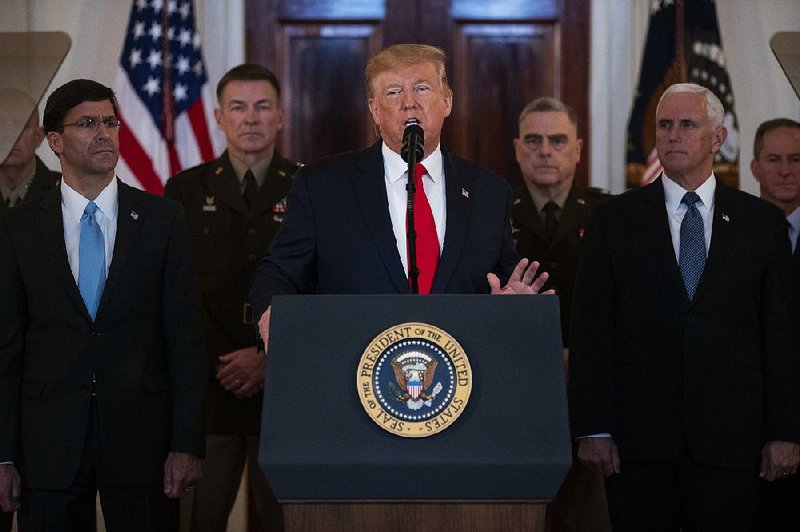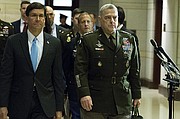WASHINGTON -- President Donald Trump on Wednesday signaled that he would not retaliate militarily for Iran's missile strikes on Iraqi bases housing U.S. troops. No one was harmed in the strikes, but U.S. forces in the region remained on high alert.
Speaking from the White House, Trump seemed intent on de-escalating the crisis, which spiraled after he authorized the targeted killing last week of Iran's top general, Qassem Soleimani. Iran responded overnight with its most direct assault on America since the 1979 seizure of the U.S. Embassy in Tehran, firing more than a dozen missiles at two installations in Iraq.
Trump's takeaway was that "Iran appears to be standing down, which is a good thing for all parties concerned and a very good thing for the world."
Despite such conciliatory talk, the region remained on edge, and American troops, including a quick-reaction force dispatched over the weekend, were on high alert. Last week Iranian-backed militias besieged the U.S. Embassy in Baghdad, and Tehran's proxies in the region remain able to carry out attacks such as the one on Dec. 27 that killed a U.S. contractor and set off the most recent round of hostilities.
[Video not showing up above? Click here to watch » https://www.youtube.com/watch?v=-sg0shTzizk]
Hours after Trump spoke, an "incoming" siren went off in Baghdad's Green Zone after what seemed to be small rockets affected the diplomatic area, a Western official said. There were no reports of casualties.
Gen. Mark Milley, the chairman of the Joint Chiefs of Staff, warned that it was "perhaps too early to tell" if Iran will be satisfied that the missile strikes were sufficient to avenge the Soleimani killing.
"We should have some expectation," Defense Secretary Mark Esper added in a Wednesday briefing, "that Shiite militia groups, either directed or not directed by Iran, will continue in some way, shape or form to try and undermine our presence there," either politically or militarily.
Trump pledged to add to his "maximum pressure" campaign of economic sanctions. He said the new, unspecified sanctions would remain in place "until Iran changes its behavior."
[Gallery not loading above? Click here for more photos » arkansasonline.com/19trump/]
Iranian Supreme Leader Ayatollah Ali Khamenei said the overnight strike was not necessarily the totality of Iran's response.
"Last night they received a slap," Khamenei said. "These military actions are not sufficient [for revenge]. What is important is that the corrupt presence of America in this region comes to an end."
Trump credited the minimized damage to an early warning system "that worked very well" and said Americans should be "extremely grateful and happy" with the outcome.
Trump, in his nine-minute, televised address, spoke of a robust U.S. military with missiles that are "big, powerful, accurate, lethal and fast." But then he added: "We do not want to use it."
Iran for days had been promising to respond forcefully to Soleimani's killing, but its limited strike on two bases -- one in the northern Iraqi city in Irbil and the other at Ain al-Asad in western Iraq -- appeared to signal that it, too, was uninterested in a wider clash with the U.S. Foreign Minister Mohammad Javad Zarif tweeted that the country had "concluded proportionate measures in self-defense."
On Wednesday, Trump said the United States was "ready to embrace peace with all who seek it." That marked a sharp change in tone from his warning a day earlier that "if Iran does anything that they shouldn't be doing, they're going to be suffering the consequences, and very strongly."
Trump opened his remarks at the White House by reiterating his promise that "Iran will never be allowed to have a nuclear weapon." Iran had announced in the wake of Soleimani's killing that it would no longer comply with any of the limits on uranium enrichment in the 2015 nuclear deal crafted to keep it from building a nuclear device.
The president, who had earlier pulled the U.S. out of the deal, seized on the moment of calm to call for negotiations toward a new agreement that would do more to limit Iran's ballistic missile programs and constrain regional proxy campaigns like those led by Soleimani.
Trump also announced that he would ask NATO to become "much more involved in the Middle East process."
Milley and Esper told reporters that 16 missiles were fired from three locations in Iran. Eleven hit the Ain al-Asad air base in Iraq's western Anbar province and one targeted a base in Irbil in Iraq's semiautonomous Kurdish region. The missiles were described as likely short-range with 1,000- to 2,000-pound warheads. Four failed to detonate, they said.
Milley added that the Pentagon believes that Iran fired the missiles with the intent "to kill personnel." He praised early warning systems, which detected the incoming ballistic missiles well in advance, providing U.S. and coalition forces adequate time to take shelter at both bases. He described the damage to tents, parking lots and a helicopter, among other things, as "nothing major."
CONGRESSMEN BRIEFED
Members of Congress were briefed on the Iran situation Wednesday afternoon in closed sessions on Capitol Hill, where Democrats and some Republicans expressed dissatisfaction with the administration's justifications for the drone strike on Soleimani.
Republican Sen. Mike Lee of Utah said it was "probably the worst briefing I've seen, at least on a military issue, in the nine years I've served in the United States Senate." He said it was "distressing" that officials suggested that it would only embolden Iran if lawmakers debated the merits of further military action. He and Sen. Rand Paul, R-Ky., announced their support of a largely symbolic war powers resolution to limit Trump's military action regarding Iran.
Democratic Speaker Nancy Pelosi announced after the briefing that the House would vote today on a war powers resolution of its own.
"Members of Congress have serious, urgent concerns about the administration's decision to engage in hostilities against Iran and about its lack of strategy moving forward," Pelosi said in a statement. "Our concerns were not addressed by the president's insufficient War Powers Act notification and by the administration's briefing today."
Most Republicans emerged from Wednesday's briefings satisfied with the administration's legal defense of the strike to kill Soleimani, they said, that rested both on the president's constitutional authority as commander in chief and the 2002 authorization for use of military force that Congress passed to pave the way for the 2003 invasion of Iraq.
Sen. Lindsey Graham, R-S.C., told reporters that Lee and Paul were "overreacting," and that senators endorsing a war powers resolution to restrain Trump's Iran response were "empowering the enemy."
"Congress authorized the deployment of troops to Iraq. Implicit in that authorization is the idea that we have an obligation to protect those troops if they are under threat," Sen. Marco Rubio, R-Fla., said. "Not only is it part of that [authorization for use of military force], it is a logical extension of that [authorization] that if you authorize troops to go somewhere, they have a right to defend themselves."
But House Democrats found the administration's legal argument "sophomoric and utterly unconvincing," as Rep. Gerald Connolly, D-Va., put it, noting that it was "absurd" to cite the 2002 authorization because it "of course had nothing to do with Iran."
Senate Democrats left the briefing with a feeling that it was unfinished. According to Sen. Tim Kaine, D-Va., Senate Minority Leader Charles Schumer, D-N.Y., asked the briefers to pledge that they would return to Capitol Hill to finish answering members' questions.
Lee and Paul shared in that frustration -- noting that the briefers could have afforded more time to the lawmakers responsible for their budgets, confirmation and authorization of their military ventures.
"They had to leave after 75 minutes while they're in the process of telling us we need to be good little boys and girls and run along and not debate this in public," Lee said. "I find that absolutely insane. I think it's unacceptable. We never got to the details."
Lee said the briefers frequently refused to answer detailed questions, arguing that specifics were "really sensitive," despite the briefing taking place in a secure facility. Graham argued that it was critics -- mainly Democrats -- who "don't want specifics," saying he was "disappointed" that so many lawmakers kept pressing the briefers to justify the attack instead of applauding the mission.
"To keep asking questions about imminence -- I mean the guy's a designated terrorist, has been killing Americans for decades, he's on the ground in Iraq, our embassy's being attacked, we've got real-time intelligence of forthcoming attacks without specific places, he's supposed to be going back to Iran to talk about it. .... Makes sense to me given the intel they had to hit him," Graham said. "I would only imagine what people would be saying if we didn't hit him, given what we knew."
Information for this article was contributed by Zeke Miller, Deb Riechmann, Robert Burns, Kevin Freking, Lolita Baldor, Darlene Superville, Alan Fram, Padmananda Rama and Sarah El Deeb of The Associated Press; by Catie Edmondson of The New York Times; and by Karoun Demirjian, Mike DeBonis, Seung Min Kim and Paul Kane of The Washigton Post.
A Section on 01/09/2020

